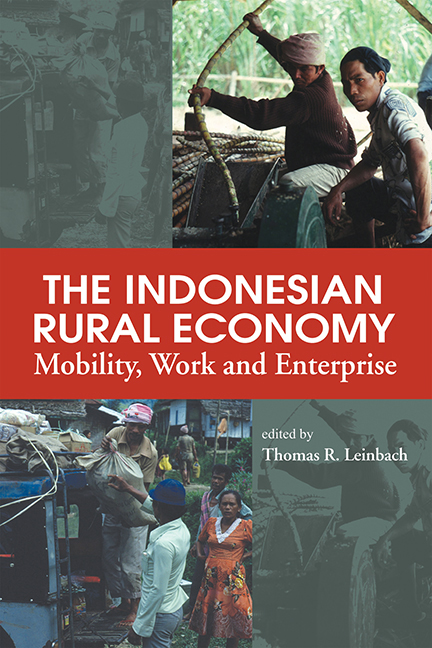Foreword
Published online by Cambridge University Press: 21 October 2015
Summary
This is an important volume. Featuring the work of leading scholars from five countries, it addresses an important dimension of the development challenges facing Indonesia, the world's fourth most populous nation.
It is also a very timely volume. There has been a rich tradition of scholarship on Indonesia's rural economy, stretching back to the colonial period. It is no exaggeration to state that, in this field, the country has been a “social laboratory” for the international research community. Indonesia was the intellectual breeding ground for Boeke's famous but now discredited theory of dualistic development. Thirty years ago, there was the landmark Penny/Singarimbun study of rural Yogyakarta, with its Malthusian subtext. There has been a long-running debate about the socio-economic impacts of technological change in rural areas, particularly centred on the introduction of new high yielding rice varieties and associated agricultural mechanization from the late 1960s onwards. There were thirty years of very rapid economic growth during the Soeharto era, accompanied by unparalleled structural change, infrastructure expansion, an oil boom and bust, and much else. All this transformed the rural economy, as never before. Finally, Indonesia's social, economic, and demographic database is one of the richest in the developing world, and its research environment one of the most open, enabling scholars to undertake very detailed research to test their favourite theories and to interact with a lively domestic community.
A fresh look at these issues in the Indonesian context is also timely in the wake of Indonesia's deep economic crisis of 1997–98, and the significant political and institutional changes triggered by the collapse of the Soeharto regime. In this new era of reformasi, much of the post-crisis literature on Indonesia has been dominated by urban-centred macroeconomics and finance — fiscal deficits and growing public debt, corporate collapse and reform, exchange rate volatility, and the like. Yet, rural and agricultural resilience has been a key factor ameliorating the socio-economic impacts of the crisis. In the long sweep of development agriculture, and the rural economy more generally, may be a shrinking share of the economy. But, as Thomas Leinbach reminds us, in important respects “Southeast Asia remains a land of farmers”.
The volume's sub-title provides the key connecting analytical themes: mobility, work, and enterprise. Organizationally, there are four chapters in each of three parts. The scene is set in Part I with an overview of the development context.
- Type
- Chapter
- Information
- The Indonesian Rural EconomyMobility, Work and Enterprise, pp. xvii - xixPublisher: ISEAS–Yusof Ishak InstitutePrint publication year: 2003

